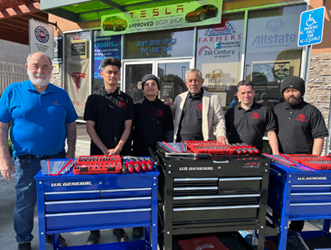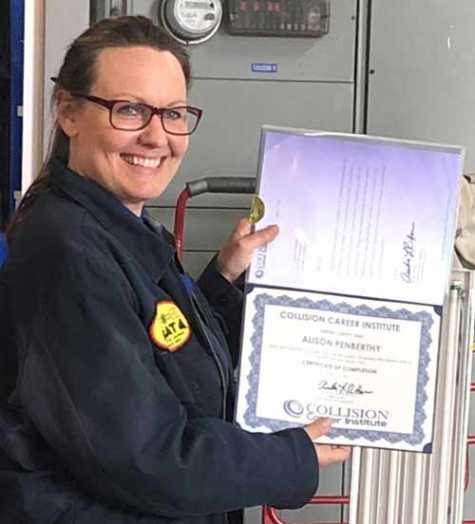It wasn’t long ago when businesses looking for new employees put an ad in the newspaper hoping for a response.
About a dozen or more candidates applied, and someone would be hired. Today, the scenario is much different. Rick White, president of 180biz, said if that same type of ad is circulated now—printed or online—shop owners and managers shouldn’t be surprised if there are no responses.
During a recent webinar coordinated by the Alliance of Automotive Service Providers (AASP), White shared advice on how to best attract and retain talent in the collision repair industry.
White said “chasing people” to come to work isn’t an effective strategy.
“The reality is that you want the best people working in your shop,” he said. “Instead of chasing people, you have to start to attract them.”
This requires a significant change in mindset. Typically, White said businesses search for help when an employee leaves the company. Instead, he recommends that owners and managers stop hiring and begin recruiting.
The best time to do this, according to White, is ALL the time.
“You want to be constantly recruiting so when somebody gives you notice, you’ll have somebody or ‘somebodies’ to call,” he said.
When an employee first gives notice, White discourages shops from accepting it.
“Let them go unless they are a superstar player,” he said. “If it is a technician, you are going to have six months of comebacks because they are no longer emotionally or mentally in the game. I guarantee that no matter how bad it seems, it’s going to be better than what you have to deal with on the other end.”
In his one-hour presentation, White shared a hiring strategy used by Apple, Google and Microsoft. Rather than putting out ads looking for candidates, companies such as these regularly receive resumes. He attributes this to their working conditions, culture and compensation.
Conditions
When a business owner first opens a new body shop, White said he or she usually sees the potential for success. Over time, this often changes, and the focus becomes the problems or challenges occurring at the company.
As a result, White stressed the importance of continuously working on a business to create better conditions.
“No matter how bad you think your current conditions are, there is another person who would kill to be in your position,” he said. “See the potential in your business and then grow and make problems better by taking baby steps—make things a little better every month.”
Over the years working with clients, White has found that constant improvement can make a big difference with a team.
“All you have to do is make improvements and people are going to think it’s amazing,” he said. “They are going to value you and see you care about them.”
Some of the examples he offered that can help improve a facility include good lighting, a system for parts, investing in equipment and training, and an organized parking lot. Good working conditions, according to White, can make the difference between a job candidate working at your shop or finding employment somewhere else.
White also recommended getting the whole team involved so there is buy-in and they feel part of the success.
Culture
White said that culture, which he defined as how a team feels working at your company, has to start with intention.
“Don’t accidentally create a culture,” he advised. “If you are not intentionally setting the culture—the values and everything you want your company run by—somebody else is.”
It all starts with hiring a new employee. White recommends having two interviews as part of the process. First, is a face-to-face interview at the shop going through a series of questions to better understand the person in a non-judgmental way.
“You are not there to determine whether or not they are a good fit; you are there to get to know them,” he explained.
The next step is to talk to his or her references. In addition to reaching out to prior employers and personal references, it can also be helpful to talk to peers. Many times, a shop owner is not going to share many details about a previous employee so there is one question White always recommends asking: Is this person eligible for rehire?
“It’s a great question to ask and you are going to get a really solid answer,” he said. “You are either going to hear, “Yes, I wish they were here today,” or “No, I don’t want to see them again.”
White said shops owners and managers should keep in mind they are hiring human beings, not machines.
“They have goals, fears, desires and nightmares,” said White. “You have to get to understand your employees and know them as well as you can.”
He pointed out that when you hire an employee, you are hiring their entire family as well.
“We have to recognize they have a life outside of the business… and they are concerned about their future,” he said. “When you get the family involved, it’s like having advocates at home that want them to stay working there.”
White provided several suggestions on how to best connect with employees and their families, such as giving birthday gifts to their children or sponsoring their soccer team. He said it can be helpful to learn what employees enjoy doing in their spare time, so if they go above and beyond at work, you can tie in different rewards and give them something meaningful.
He advised always being up-front with employees, creating a safe place for them to work, letting them know what’s going on in the business so they don’t worry, and always showing appreciation for their efforts.
“They need a mentor and a friend—someone who cares about them and wants to see them achieve the highest they possibly can,” he said.
Once a business culture is created, the next step is to communicate it to employees and explain what is expected.
“The goal of communication is to convey a thought or process or act to another person,” he explained. “You want them walking away with the same picture in their head as you have.”
In order to best communicate the message, he recommended talking slowly, really listening, and using what he referred to as the seven “Cs.” These include being clear, correct, concise, complete, concrete, considerate and courteous.
Compensation
It should come as no surprise that excellent compensation is going to help attract and retain quality people, according to White. When deciding whether or not to offer a raise, he advised not to give an incremental cost of living raises. He referred to this as “replacement raises”—the cost of replacing an employee.
“When thinking of compensation, recognize it’s wages as well as bonuses. Money is not going to be the key driver,” he explained. “Instead, you have to tap into why they are in this industry, what brought them here, and what they want to do.”
White encouraged shop owners to think differently about what is offered to employees. That might include providing health insurance, a flexible schedule, paying for tools, tuition assistance or retirement.
“The reality is the status quo doesn’t work anymore,” said White. “It’s going to be new thinking and new actions that are going to make a difference and it all starts with you.”
For more information, email White at rick@180biz.com or call 540-833-2014 ext. 11.















Stacey Phillips Ronak